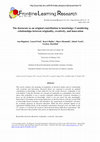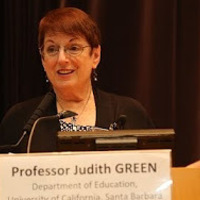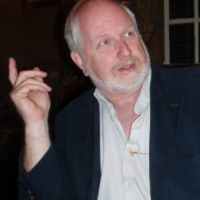Books by Ana Vitoria Baptista

Resumo:
O presente trabalho tem o propósito de caracterizar, sob vários pontos de
vista, o pr... more Resumo:
O presente trabalho tem o propósito de caracterizar, sob vários pontos de
vista, o primeiro grupo de estudantes Maiores de 23 que se matriculou na
Universidade de Aveiro, no ano lectivo 2006-07. Como enquadramento teórico deste estudo, abordamos algumas temáticas, tratadas de forma articulada, para melhor podermos analisar e problematizar os dados que recolhemos no contexto específico da Universidade de Aveiro. Assim, iniciaremos por esboçar um contexto mais geral e transversal, onde reveremos algumas características dos tempos de hoje. Seguidamente, trataremos de forma mais aprofundada tópicos como: o Ensino Superior e o Processo de Bolonha, a Aprendizagem ao Longo da Vida e a Estratégia de Lisboa. Ao relermos vários documentos teremos em consideração a análise de aspectos ligados à abertura do Ensino Superior a novos públicos e à equidade, assim como à criação de novas oportunidades. Para terminarmos a primeira parte deste trabalho, faremos uma primeira aproximação à caracterização dos estudantes adultos não-tradicionais, a nossa população-alvo, sob o ponto de vista teórico. Na segunda parte, realizaremos a descrição do nosso estudo empírico. Depois de nos debruçarmos sobre a metodologia da investigação, analisaremos e discutiremos os dados, recolhidos através de questionários, cartas de motivação e entrevistas semi-orientadas. Recorrendo a métodos de análise de cariz quantitativo e qualitativo, entrecruzaremos os dados colectados com o objectivo de discutirmos a temática escolhida, sobre vários pontos de vista, e chegarmos a conclusões credíveis. Tencionamos que este seja um primeiro contributo para caracterizar o estudante adulto não-tradicional Maior de 23 da Universidade de Aveiro.
Abstract:
The main purpose of this work is to characterise, according to several points of view, the first group of the students over 23 years old, enrolled at the University of Aveiro in the academic year of 2006-07. The theoretical framework of this study will be explored in an articulated manner, in order to better analyse and discuss the data, collected in a specific context: the University of Aveiro. Therefore, in the first part, we will start to design a more general and transversal context, based on the ideas of the complexity and ‘supercomplexity’ of today’s world, to delineate the demands of our society. Then, we will focus on certain topics, such as: Higher Education and the Bologna Process, Lifelong Learning and the Lisbon Strategy, taking into account their main principles which may be dialogued. When reflecting about certain documents, we will approach them according to themes such as: the openness of Higher Education to new publics, the emphasis put on equity, and the creation of new opportunities. Also, we will make a first approach to the characterisation of non-traditional adult students, our target population, considering a theoretical perspective, based on the literature review. In the second part, we will describe our empirical study. After describing the research methodology, we will analyse and discuss the results collected through questionnaires, motivation letters and semi-oriented interviews. Quantitative and qualitative methods will be used. The data will be intersected with the main goal of discussing this subject through different but interconnected perspectives, so that we can reach credible conclusions. This may be a first contribute to characterise the group of non-traditional adult student over 23 years old at the University of Aveiro."""
Papers by Ana Vitoria Baptista

BMC Medical Education
Introduction Imperial College Teddy Bear Hospital (ICSM-TBH) is a student-led volunteering group,... more Introduction Imperial College Teddy Bear Hospital (ICSM-TBH) is a student-led volunteering group, which uses interactive, play-based teaching to educate school pupils aged 5–7 years about healthy lifestyles and healthcare. During the COVID-19 pandemic, volunteering sessions shifted online. The aim of this study was to compare the value of online and in-person ICSM-TBH volunteering for volunteers and school pupils. Methods Undergraduate university students at Imperial College London (medicine can be taken as a first degree in the UK) who volunteered with ICSM-TBH between 2019 and 22 were invited to complete an anonymous online questionnaire evaluating their experiences of volunteering online and in-person through Likert-scale questions. Those who completed the questionnaire were also invited to an interview. Teachers who hosted online ICSM-TBH sessions were also invited to an in-person interview, exploring their view of their pupils’ experiences with these sessions. Questionnaire res...
Journal of the world universities forum, 2008
IX Congreso internacional galego-portugués de psicopedagoxía, 2007, 2007
Resumen: A uma velocidade cada vez mais estonteante, vamos observando variadas mudanças e novas e... more Resumen: A uma velocidade cada vez mais estonteante, vamos observando variadas mudanças e novas exigências na sociedade contemporânea, onde a informação eo conhecimento pululam, tendo todos nós de responder a inúmeras solicitações da mais ...
With this poster and handout the authors intend to briefly present (i) the generic context in whi... more With this poster and handout the authors intend to briefly present (i) the generic context in which the study supports itself, namely its pertinence, the main theoretical guidelines as well as the challenges when discussing this issue; and (ii) the methodological approach of the study about doctoral supervision quality which is being run at a specific Higher Education (HE) institution with the greater objective of designing a reference framework. Although this research is being developed at a specific HE institution, it is undoubtable the general relevance of engaging academic community in discussing conceptions, experiences and practices, since the enhancement of doctoral supervision quality is a pertinent subject to most countries and HE institutions. Thus, the transversal and supra-national character of this issue is unquestionable.
Journal of Continuing Education in Nursing, Mar 1, 2019
This article describes the perceptions of a small group of nursing education faculty members part... more This article describes the perceptions of a small group of nursing education faculty members participating in the continuing professional development module, Pedagogy in Higher Education, regarding the use of active learning strategies. Data were collected using field notes and participants' presentations and articles about their experiences when using innovative teaching strategies. The findings point out the benefits for knowledge mobilization, the development of synergies based on collaboration, and other gains in terms of students' experiences. Challenges involve the use of these active strategies on a regular basis as part of a sustained and aligned approach to enhance teaching and learning. [ J Contin Educ Nurs. 2019;50(3):134–140.]

This paper is a continuation of the theme discussed in the paper “The meaning and the value as tr... more This paper is a continuation of the theme discussed in the paper “The meaning and the value as triggers for designing significant experiences” presented at the 3rd edition of this Conference in 2019. Having dealt with the fact that meaning and value are fundamental requirements to activate a symbolic relationship with objects, we have also concluded that these qualities come from both the level of commitment assumed by the person during the interactive communication process and the durability of the solutions proposed by the designer. Competing with the trivialization brought by the familiarity of the object – a useful strategy in a consumer society – lacks, however, an ability of the designer to propose durable solutions which can continuously feed the interest of the user. In this article we critically address the importance of playfulness as a trigger for designing significant experiences in graphic and product design initiatives, as well as the insignificance of this aspect when seeking an immediate or visceral impact. We present examples and perspectives put forward by such different personalities such as Kenya Hara, Naoto Fukasawa, Donald Norman, Pine and Gilmour, Huizinga and Roger Collois. We aim at contributing to a comprehensive and enveloped reflection of the ludicity, collaborative and affective dimension of Design as catalyst of the emotive value of the communication process

Springer Series in Design and Innovation, 2019
Nowadays, factors such as the accelerated cultural dematerialization, the unprecedented participa... more Nowadays, factors such as the accelerated cultural dematerialization, the unprecedented participatory culture, and a new kind of social values have become crucial for understanding the human experience. This scenario implies an inevitable revision of design, and its educational approaches so it is adaptable to new circumstances. The relevance of this study lies in the critical approach used to review the current design models, and the discrepancy that has been observed between research processes and practices, and the effective practice and application of design. We will thus be discussing the (underdeveloped) competences and skills of today’s designers, namely relating to the participatory approach and the decentralization of their role. These latter concepts are of fundamental importance to reflect on the articulation with the immaterial and relational culture of current days. We argue that what is new in the concept of design is its understanding as a process. It should thus be considered a means to achieve an end, and not an end in itself. As Dunne (2008) states, the design has the potential of being ‘a tool of doing’. Therefore, design is seen by the latest research within the field as a means to drive flexible solutions, to produce continuous adaptations in order to contribute to a constantly changing context. In this book chapter, we will thus underline that the education of the future designer should (i) incorporate an articulated understanding of the problems, which are considered within a system or web of relationships, and (ii) promote the development of competences and skills that are essential to manage a consciously decentralized role by using open and flexible methodologies applied to different actors.

Frontline learning research, Oct 6, 2015
This article explores the meaning of originality in doctoral studies and its relationship with cr... more This article explores the meaning of originality in doctoral studies and its relationship with creativity and innovation. Doctoral theses are expected to provide an original contribution to knowledge in their field all over the world. However, originality is not well defined. Using the literature on concepts of originality as a foundation, this article shows that originality is not a concept commonly understood. Creativity introduces a focus on the production of knowledge, which is not just novel but also meaningful. Innovation is becoming of increasing importance in doctoral theses with the societal shift to knowledge-based economies and introduces the requirement of immediate relevance for economic purposes in doctoral education. While the three elements appear to be substantial building blocks of the potential contribution doctoral work can make in the 21 st century, it is unclear the extent to which doctoral theses fulfil these expectations. The article discusses this problem with a focus on implications for doctoral education.

Resumo: Este estudo incidiu sobre o valor didático de um dos recursos utilizados no contexto das ... more Resumo: Este estudo incidiu sobre o valor didático de um dos recursos utilizados no contexto das aulas práticas de Biologia do ensino secundário português: o relatório do tipo 'V de Gowin'. Assim, o objetivo foi investigar o seu papel na realização de aprendizagens significativas, tendo-se procedido à análise de conteúdo de 41 relatórios produzidos pelos alunos de uma turma de Biologia do 11.º ano. Os relatórios foram elaborados individualmente no âmbito de duas atividades práticas laboratoriais, "Mitose em células vegetais" e "Extração de DNA", durante o 2º período do ano letivo 2016/2017. Dada a relevância do questionamento nos processos de ensino e de aprendizagem, a análise centrou-se na categorização do nível cognitivo e da natureza das questões-problema, uma das componentes específicas de um relatório do tipo 'V de Gowin'. Procedeu-se ainda à análise das conclusões dos relatórios para verificar se as











Uploads
Books by Ana Vitoria Baptista
O presente trabalho tem o propósito de caracterizar, sob vários pontos de
vista, o primeiro grupo de estudantes Maiores de 23 que se matriculou na
Universidade de Aveiro, no ano lectivo 2006-07. Como enquadramento teórico deste estudo, abordamos algumas temáticas, tratadas de forma articulada, para melhor podermos analisar e problematizar os dados que recolhemos no contexto específico da Universidade de Aveiro. Assim, iniciaremos por esboçar um contexto mais geral e transversal, onde reveremos algumas características dos tempos de hoje. Seguidamente, trataremos de forma mais aprofundada tópicos como: o Ensino Superior e o Processo de Bolonha, a Aprendizagem ao Longo da Vida e a Estratégia de Lisboa. Ao relermos vários documentos teremos em consideração a análise de aspectos ligados à abertura do Ensino Superior a novos públicos e à equidade, assim como à criação de novas oportunidades. Para terminarmos a primeira parte deste trabalho, faremos uma primeira aproximação à caracterização dos estudantes adultos não-tradicionais, a nossa população-alvo, sob o ponto de vista teórico. Na segunda parte, realizaremos a descrição do nosso estudo empírico. Depois de nos debruçarmos sobre a metodologia da investigação, analisaremos e discutiremos os dados, recolhidos através de questionários, cartas de motivação e entrevistas semi-orientadas. Recorrendo a métodos de análise de cariz quantitativo e qualitativo, entrecruzaremos os dados colectados com o objectivo de discutirmos a temática escolhida, sobre vários pontos de vista, e chegarmos a conclusões credíveis. Tencionamos que este seja um primeiro contributo para caracterizar o estudante adulto não-tradicional Maior de 23 da Universidade de Aveiro.
Abstract:
The main purpose of this work is to characterise, according to several points of view, the first group of the students over 23 years old, enrolled at the University of Aveiro in the academic year of 2006-07. The theoretical framework of this study will be explored in an articulated manner, in order to better analyse and discuss the data, collected in a specific context: the University of Aveiro. Therefore, in the first part, we will start to design a more general and transversal context, based on the ideas of the complexity and ‘supercomplexity’ of today’s world, to delineate the demands of our society. Then, we will focus on certain topics, such as: Higher Education and the Bologna Process, Lifelong Learning and the Lisbon Strategy, taking into account their main principles which may be dialogued. When reflecting about certain documents, we will approach them according to themes such as: the openness of Higher Education to new publics, the emphasis put on equity, and the creation of new opportunities. Also, we will make a first approach to the characterisation of non-traditional adult students, our target population, considering a theoretical perspective, based on the literature review. In the second part, we will describe our empirical study. After describing the research methodology, we will analyse and discuss the results collected through questionnaires, motivation letters and semi-oriented interviews. Quantitative and qualitative methods will be used. The data will be intersected with the main goal of discussing this subject through different but interconnected perspectives, so that we can reach credible conclusions. This may be a first contribute to characterise the group of non-traditional adult student over 23 years old at the University of Aveiro."""
Papers by Ana Vitoria Baptista
O presente trabalho tem o propósito de caracterizar, sob vários pontos de
vista, o primeiro grupo de estudantes Maiores de 23 que se matriculou na
Universidade de Aveiro, no ano lectivo 2006-07. Como enquadramento teórico deste estudo, abordamos algumas temáticas, tratadas de forma articulada, para melhor podermos analisar e problematizar os dados que recolhemos no contexto específico da Universidade de Aveiro. Assim, iniciaremos por esboçar um contexto mais geral e transversal, onde reveremos algumas características dos tempos de hoje. Seguidamente, trataremos de forma mais aprofundada tópicos como: o Ensino Superior e o Processo de Bolonha, a Aprendizagem ao Longo da Vida e a Estratégia de Lisboa. Ao relermos vários documentos teremos em consideração a análise de aspectos ligados à abertura do Ensino Superior a novos públicos e à equidade, assim como à criação de novas oportunidades. Para terminarmos a primeira parte deste trabalho, faremos uma primeira aproximação à caracterização dos estudantes adultos não-tradicionais, a nossa população-alvo, sob o ponto de vista teórico. Na segunda parte, realizaremos a descrição do nosso estudo empírico. Depois de nos debruçarmos sobre a metodologia da investigação, analisaremos e discutiremos os dados, recolhidos através de questionários, cartas de motivação e entrevistas semi-orientadas. Recorrendo a métodos de análise de cariz quantitativo e qualitativo, entrecruzaremos os dados colectados com o objectivo de discutirmos a temática escolhida, sobre vários pontos de vista, e chegarmos a conclusões credíveis. Tencionamos que este seja um primeiro contributo para caracterizar o estudante adulto não-tradicional Maior de 23 da Universidade de Aveiro.
Abstract:
The main purpose of this work is to characterise, according to several points of view, the first group of the students over 23 years old, enrolled at the University of Aveiro in the academic year of 2006-07. The theoretical framework of this study will be explored in an articulated manner, in order to better analyse and discuss the data, collected in a specific context: the University of Aveiro. Therefore, in the first part, we will start to design a more general and transversal context, based on the ideas of the complexity and ‘supercomplexity’ of today’s world, to delineate the demands of our society. Then, we will focus on certain topics, such as: Higher Education and the Bologna Process, Lifelong Learning and the Lisbon Strategy, taking into account their main principles which may be dialogued. When reflecting about certain documents, we will approach them according to themes such as: the openness of Higher Education to new publics, the emphasis put on equity, and the creation of new opportunities. Also, we will make a first approach to the characterisation of non-traditional adult students, our target population, considering a theoretical perspective, based on the literature review. In the second part, we will describe our empirical study. After describing the research methodology, we will analyse and discuss the results collected through questionnaires, motivation letters and semi-oriented interviews. Quantitative and qualitative methods will be used. The data will be intersected with the main goal of discussing this subject through different but interconnected perspectives, so that we can reach credible conclusions. This may be a first contribute to characterise the group of non-traditional adult student over 23 years old at the University of Aveiro."""